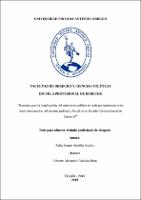| dc.contributor.advisor | Palacios Bran, Roberto Alejandro | |
| dc.contributor.author | Murillo Avalos, Zoila Raquel | |
| dc.creator | Murillo Avalos, Zoila Raquel | |
| dc.date.accessioned | 2020-07-02T14:02:46Z | |
| dc.date.available | 2020-07-02T14:02:46Z | |
| dc.date.issued | 2020 | |
| dc.identifier.uri | https://hdl.handle.net/20.500.12759/6336 | |
| dc.description.abstract | Uno de los principales pilares para la existencia de un correcto funcionamiento de justicia dentro de los órganos de un Estado Constitucional de Derecho es la aplicación de un sistema de control, que fije parámetros y lineamientos que permitan dentro de un sistema de administración de justicia racionalizar el ejercicio de poder por parte de quien lo ejerce.
El antejuicio político es una figura normativa que se desarrolla como un instrumento de control y a su vez como un procedimiento congresal o parlamentario. Este último viene generando en la actualidad considerables complicaciones para una correcta administración de justicia dentro de un Estado de Derecho. Esta problemática es que la plantearemos en el presente trabajo dentro del capítulo I. Asimismo, teniendo en cuenta que en todo Estado de Derecho existen mecanismos de control de poder dirigido a todo funcionario o servidor público, en el capítulo II definiremos cuáles son aquellas facultades y competencias de los funcionarios de un sistema parlamentario, judicial y fiscal. En este capítulo trataremos también un tema de actualidad social, que viene a ser la extralimitación de los parlamentarios en el ejercicio de sus funciones y los grandes perjuicios que ello acarrea.
En el capítulo III explicaremos cuáles son las razones y motivos que originan que el antejuicio político, como procedimiento y mecanismo de control, limite y permita que los funcionaros y/o servidores públicos no sigan los lineamientos y principios que un Estado de Derecho establece, evitando que respondan frente a los actos contrarios a la ley que cometen en el ejercicio de sus funciones.
Finalmente, luego de haber desarrollado los conceptos anteriores, en el capítulo IV propondremos un cambio en la normativa correspondiente al antejuicio político, a fin de evitar que esta sea utilizada más como una protección para los altos funcionarios, buscando para ello trasladar la competencia que le corresponde al Congreso de la República en materia de antejuicio político a un nuevo ente regulador que se comporte como un órgano constitucional autónomo. De esta manera la presente investigación busca aportar a uno de los fines esenciales del Estado Constitucional de Derecho, el cual es preservar un correcto funcionamiento de justicia que funcione de manera eficaz y transparente. | es_PE |
| dc.description.abstract | One of the main pillars for the existence of a correct functioning of justice within the organs of a Constitutional State of Law is the application of a control system, which sets parameters and guidelines that allow within a system of administration of justice to rationalize the exercise of power by whoever exercises it.
Political prejudice is a normative figure that develops as an instrument of control and in turn as a congressional or parliamentary procedure. The latter is currently generating considerable complications for the proper administration of justice within a rule of law. This problem is that we will raise it in the present work within chapter I. Also, taking into account that in every State of Law there are mechanisms of power control addressed to any civil servant or public servant, in chapter II we will define which are those faculties and competencies of the officials of a parliamentary, judicial and fiscal system. In this chapter we will also discuss a topic of social news, which becomes the overreach of parliamentarians in the exercise of their functions and the great damages that this entails.
In Chapter III, we will explain what are the reasons and motives that cause political prejudice, as a procedure and control mechanism, to limit and allow civil servants and / or public servants not to follow the guidelines and principles established by a Rule of Law, avoiding that respond to acts contrary to the law that they commit in the exercise of their functions.
Finally, after having developed the above concepts, in chapter IV we will propose a change in the regulations corresponding to political prejudice, in order to prevent it from being used more as a protection for senior officials, seeking to transfer the competence that It corresponds to the Congress of the Republic in matters of political prejudice to a new regulatory entity that acts as an autonomous constitutional body. In this way, the present investigation seeks to contribute to one of the essential purposes of the Constitutional State of Law, which is to preserve a proper functioning of justice that works effectively and transparently. | en_US |
| dc.description.uri | Tesis | es_PE |
| dc.format | application/pdf | es_PE |
| dc.language.iso | spa | es_PE |
| dc.publisher | Universidad Privada Antenor Orrego | es_PE |
| dc.relation.ispartofseries | T_DER_498 | |
| dc.rights | info:eu-repo/semantics/openAccess | es_PE |
| dc.rights.uri | https://creativecommons.org/licenses/by/4.0/ | es_PE |
| dc.source | Universidad Privada Antenor Orrego | es_PE |
| dc.source | Repositorio Institucional - UPAO | es_PE |
| dc.subject | Antejuicio político | es_PE |
| dc.subject | Estado constitucional de derecho | es_PE |
| dc.title | Razones para la inaplicación del antejuicio político en sede parlamentaria a los altos funcionarios del sistema judicial y fiscal de un estado constitucional de derecho | es_PE |
| dc.type | info:eu-repo/semantics/bachelorThesis | es_PE |
| thesis.degree.level | Título Profesional | es_PE |
| thesis.degree.grantor | Universidad Privada Antenor Orrego. Facultad de Derecho y Ciencias Politicas | es_PE |
| thesis.degree.name | Abogada | es_PE |
| thesis.degree.discipline | Derecho | es_PE |
| dc.subject.ocde | https://purl.org/pe-repo/ocde/ford#5.05.00 | es_PE |
| renati.type | https://purl.org/pe-repo/renati/type#tesis | es_PE |
| renati.level | https://purl.org/pe-repo/renati/level#tituloProfesional | es_PE |
| renati.discipline | 421016 | es_PE |
| dc.publisher.country | PE | es_PE |


